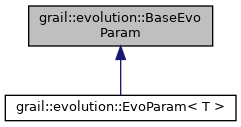 |
Grail (C++)
1.4.0
A multi-platform, modular, universal engine for embedding advanced AI in games.
|
 |
Grail (C++)
1.4.0
A multi-platform, modular, universal engine for embedding advanced AI in games.
|
BaseEvoParam - A class that represents a parameter that is modifiable (optimizable) by evolutionary algorithms.
Unless your parameter is only a positional index (represented by an integer from 0 to max), use a specialized version 'EvoParam<Type>'.
These parameters form an encoding and are stored as member Fields or Properties in an 'Individual' and set as optimizable using 'Individual::SetMemberParameterOptimizable'.
Typically, the 'Individual.SetMemberParameterOptimizable' function should be called in the constructor of an 'Individual'-derived class.
More...
#include <EvoParam.hh>

Public Member Functions | |
| BaseEvoParam (size_t domainLength) | |
| BaseEvoParam - Constructor. More... | |
| void | Randomize (std::mt19937_64 &rand_gen) |
| Sets to a random possible value from a domain. More... | |
| const BaseEvoParam * | SetNext () |
| Sets to the next possible value in the domain (wrapped, i.e. last.next -> first). More... | |
| const BaseEvoParam * | SetPrev () |
| Sets to the previous possible value in the domain (wrapped, i.e. first.prev -> last). More... | |
| const BaseEvoParam * | SetNextClamped () |
| Sets to the next possible value in the domain (clamped, i.e. last.next -> last). More... | |
| const BaseEvoParam * | SetPrevClamped () |
| Sets to the previous possible value in the domain (clamped, i.e. first.prev -> first). More... | |
| float | GetNormalizedPositionWeight () const |
| The normalized position, between 0.0 and 1.0, is the ratio of the current position index to the domainLength. More... | |
| size_t | GetPositionIndex () const |
| Returns the position of the parameter. BaseEvoParam uses PositionIndex to point to an element from its domain. More... | |
| void | SetPositionIndex (size_t position) |
| Sets the position of the parameter. Setting this index makes the parameter hold the PositionIndex-ith value from the domain. Index starts at zero. More... | |
| virtual std::string | ToString () const |
| ToString - returns a string representation of the current value hold by the parameter. | |
| size_t | GetDomainLength () const |
| Gets the number of distinct values BaseEvoParam may take. | |
Protected Attributes | |
| const size_t | domainLength = 1 |
| domainLength - the number of distinct values BaseEvoParam may take. | |
BaseEvoParam - A class that represents a parameter that is modifiable (optimizable) by evolutionary algorithms.
Unless your parameter is only a positional index (represented by an integer from 0 to max), use a specialized version 'EvoParam<Type>'.
These parameters form an encoding and are stored as member Fields or Properties in an 'Individual' and set as optimizable using 'Individual::SetMemberParameterOptimizable'.
Typically, the 'Individual.SetMemberParameterOptimizable' function should be called in the constructor of an 'Individual'-derived class.
| grail::evolution::BaseEvoParam::BaseEvoParam | ( | size_t | domainLength | ) |
BaseEvoParam - Constructor.
| domainLength | - the number of distinct values this parameter may take. |
| float grail::evolution::BaseEvoParam::GetNormalizedPositionWeight | ( | ) | const |
The normalized position, between 0.0 and 1.0, is the ratio of the current position index to the domainLength.
| size_t grail::evolution::BaseEvoParam::GetPositionIndex | ( | ) | const |
Returns the position of the parameter. BaseEvoParam uses PositionIndex to point to an element from its domain.
| void grail::evolution::BaseEvoParam::Randomize | ( | std::mt19937_64 & | rand_gen | ) |
Sets to a random possible value from a domain.
| rand_gen | - random number generator. |
| const BaseEvoParam * grail::evolution::BaseEvoParam::SetNext | ( | ) |
Sets to the next possible value in the domain (wrapped, i.e. last.next -> first).
| const BaseEvoParam * grail::evolution::BaseEvoParam::SetNextClamped | ( | ) |
Sets to the next possible value in the domain (clamped, i.e. last.next -> last).
| void grail::evolution::BaseEvoParam::SetPositionIndex | ( | size_t | position | ) |
Sets the position of the parameter. Setting this index makes the parameter hold the PositionIndex-ith value from the domain. Index starts at zero.
| position | - the number >= 0 and < domainLength. |
| const BaseEvoParam * grail::evolution::BaseEvoParam::SetPrev | ( | ) |
Sets to the previous possible value in the domain (wrapped, i.e. first.prev -> last).
| const BaseEvoParam * grail::evolution::BaseEvoParam::SetPrevClamped | ( | ) |
Sets to the previous possible value in the domain (clamped, i.e. first.prev -> first).